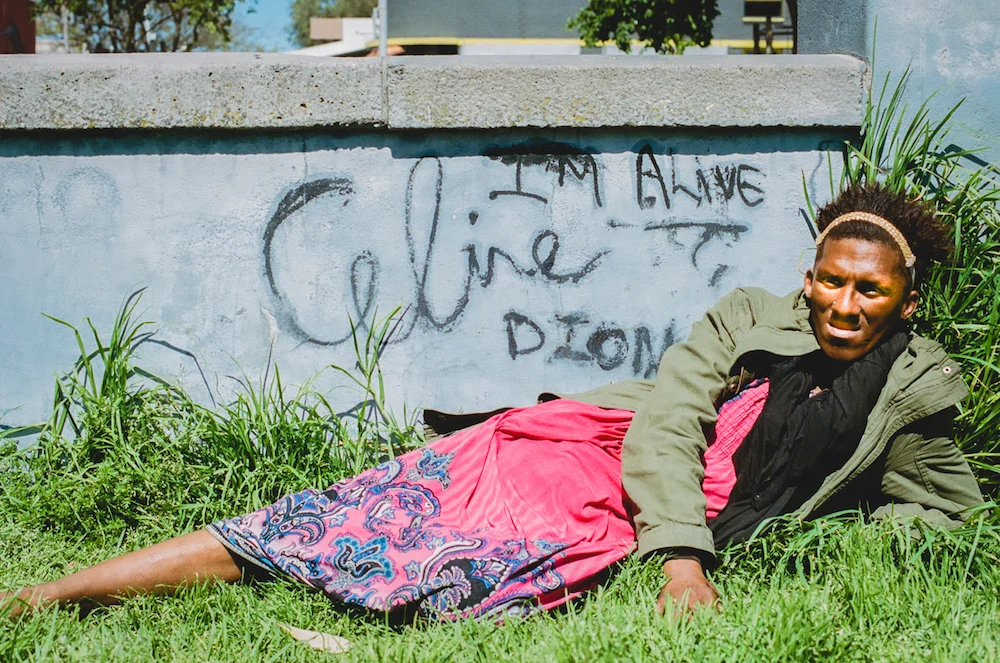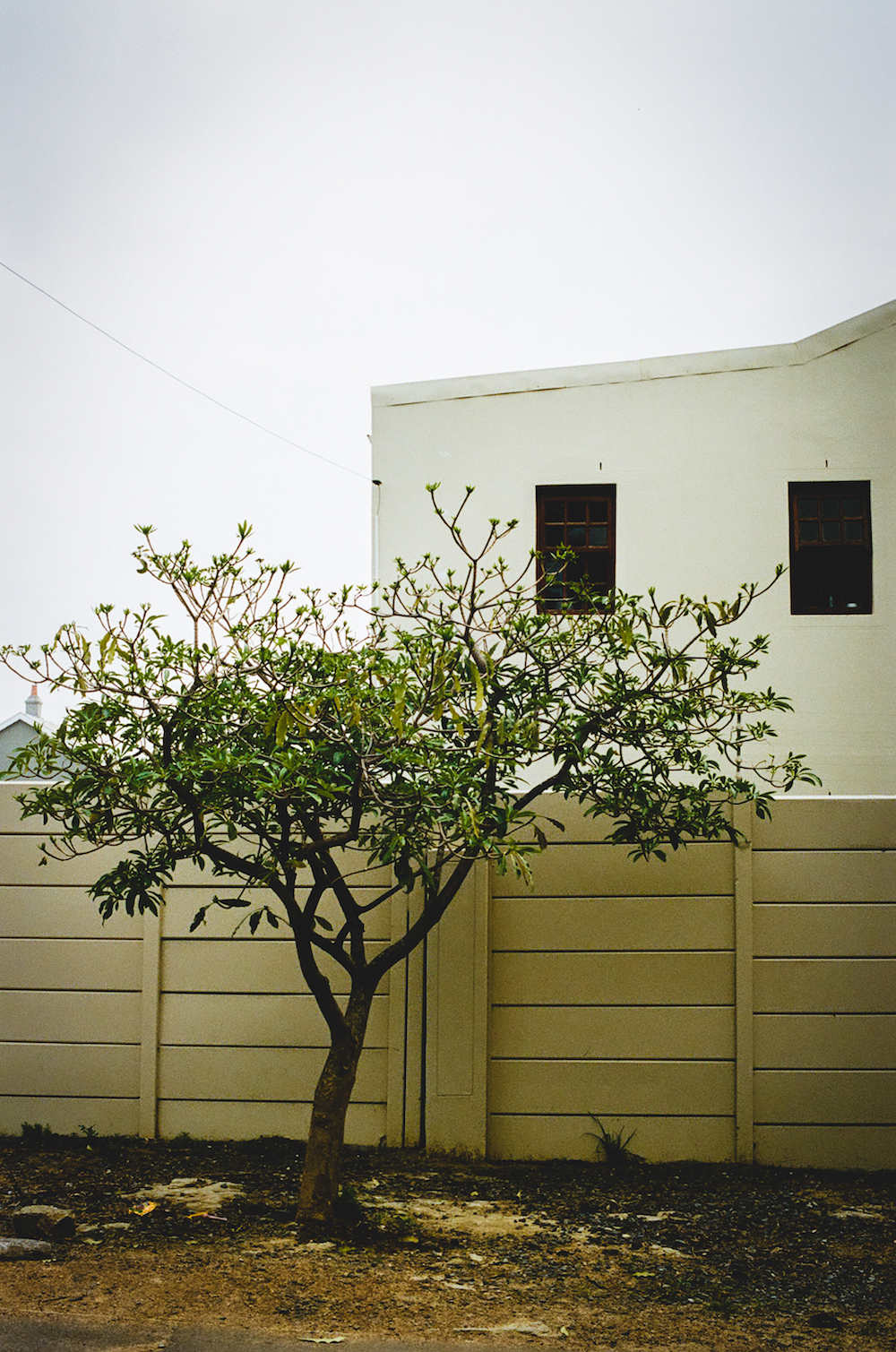Born Kirston Oliver, Celine's first female name was Maxine van Staden. After a revelatory experience seeing Celine Dion in concert at Vergelegen Wine Estate in Somerset West on Valentine's Day 2008, however, Celine's friends began referring to her by the name of the pop diva with whom she was so enamored.
“I’m intrigued by the duality of memory, and the fact that it is a permanent record but also one that is highly subjective and malleable.”
Madeleine Bazil is currently pursuing an ongoing, longterm documentary photographic project following the life of Celine (birth name Kierston Oliver), a transgender woman who has been experiencing homelessness in Cape Town for the past 10 years. Celine left her family's home in Ceres, Western Cape, as a young person due to her family's lack of acceptance of her gender identity and has struggled with life on the streets. As a recovering alcoholic, she finds it hard to bond with other members of the local homeless community, for whom drink is often a major escape; as a transgender woman she also faces increased risk to her personal safety on the streets, something of which she is highly aware. This work, an ongoing collaboration of trust and friendship between Madeleine and Celine comprising 35mm portraits of her, quotes from conversations, and pages from her journal. This a documentation of her life, dreams, and the obstacles she faces in achieving these dreams.
"I discovered that I am actually alone," Celine says of the time after being released from the hospital in 2006. "And because I'm alone, I have to fall in love with myself. I have to understand the things that I cannot change."
Tell us about your project! How did this idea come about? From starting point to now, how has this flourished?
Celine is an ongoing, long-term photographic project documenting the life of Celine; a transgender woman who has been experiencing homelessness in Cape Town, South Africa for the past 15 years.
I met Celine because we live in the same neighborhood, Observatory. During Apartheid, under the Group Areas Act, this was one of the few areas of Cape Town to be a de facto 'grey zone' where black, white, and colored South Africans lived together. Today, Observatory is a student-populated area of gentrified bohemia but retains vestiges of its mixed socioeconomic history. Like all of Cape Town, it’s a place of extreme opposition, a living example of combined and uneven development. But at the same time, it’s also a very close-knit neighborhood. Everyone coexists. Even when we’re not shooting, I run into Celine at the supermarket or in the park. We’re neighbors.
My major preoccupation throughout all the projects I pursue is memory - both collective and individual. I’m intrigued by the duality of memory, and the fact that it is a permanent record but also one that is highly subjective and malleable. I’m especially interested in how people and societies navigate personal and cultural trauma. I’m passionate about stories that explore the diversity of the female experience. A big priority for me, which is grounded in my experiences in the NGO/nonprofit space, is the idea of taking a humanistic approach to storytelling. I feel strongly that this project is a collaboration, wherein Celine is granted the dignity of getting to help shape her portrayal in a story that ultimately belongs to her.
So this project ticks all the boxes, but I actually didn’t seek it out for those reasons. When Celine heard that I’m a photographer, she approached me with the idea of telling her story. The series has developed organically from there.
A page from one of Celine's journals holds one of her original poems/songs, Liesbeek Tears, named for the parkway which bisects the neighborhood of Observatory.
A page from Celine's scrapbook contains an original poem, written on a recent visit home to her family in Ceres.
Tell us about how this project has impacted you personally.
Working on this project has made me much more cognizant of the variety of lived experience existing in my little suburb. But this is a body of work that really isn’t about me at all. It is a privilege and a responsibility to be the conduit.
How has you documenting Celine’s life impacted Celine?
I relayed this question to Celine and she emphasized to me that a big priority and interest for her is the idea of “human values”. Something she tells me she thinks about frequently is the fact that everyone you meet or pass on the street has a rich inner life and a story within them, and that it is easy for people to forget or ignore this - and how dehumanizing that ignorance is. As a natural and prolific storyteller, she is excited to have the opportunity to share.
Celine poses for a photo in front of a graffiti affirmation she painted back in 2015 in the park where she stays. Visible only from the interior of the park, this is a personal reminder for herself to keep going even when things are tough.
Between 2009 and 2012, Celine traveled to Johannesburg, to her family's Mpumalanga hometown of Standerton, and finally to Durban. Having already been hospitalized once for depression prior to this, Celine struggled with her mental health and with addiction throughout this time. She quit drinking cold-turkey while living in Durban because the anti-depressants her doctor had prescribed her could not be mixed with alcohol, but continued to battle with her mental health. Upon returning to Cape Town in 2012, she was once again hospitalized in the psychiatric ward at Groote Schuur Hospital after another homeless woman who stayed in the same park phoned an ambulance for her. "I started shivering, I wanted to cut [myself] with blades and stuff. I was really depressed..." After being discharged from Groote Schuur, Celine was sent to rehab in Stellenbosch to receive treatment for alcoholism and depression, where she found herself surrounded by familiar faces from her school days and hometown: "When I got to the rehab, I was like, oh my god. This is half of the people I know."
What inspires and motivates you to keep growing and challenging yourself?
I am always trying to challenge myself by experimenting with form and process, as well as by digging deeper into subject matter especially when it’s uncomfortable. The creative people I admire most are the ones who are constantly innovating, reinventing their crafts, never getting complacent or allowing themselves to be pigeonholed. That’s what I aspire toward. I think everyone sees a gulf between the work they’re doing now and the potential they envision achieving, and we’re all just out here trying to bridge that for ourselves.
What do you hope your project accomplishes?
Part of what I want to do here is to explore the idea that the communities we live in are not just places we inhabit, but moreover places which we build and shape by virtue of our memories and the power of our existences.
Ultimately I’d like this series to be one piece of a much bigger project documenting a wide range of specific female experiences around Cape Town - not in an effort to generalize or to make the specific stand for the many, but rather to take a stab at providing an honest and varied examination of the contemporary female presence in this city.
In a place like South Africa, or really in any country with a complicated past, the social politics of who speaks the cultural narrative take on a multitude of layers. There’s a long way for us to go in unpacking that. I think the first step is through engagement, through bearing witness to these narratives.
In the 13 years that Celine has lived in Observatory, she has mainly slept in the park at the end of this road. "The night life in Obs... is very hustle-y. It's very tough to ask for something to eat... it's very tough."
An Observatory street. "Today I'm one of the leaders in Obs, one of the well-known people," says Celine. "People are always looking for me. I meet about 300 people a day." On begging in Observatory, she says: "It's very different [than in other places]: it's about connections. You have to know people. There's no use just asking people, you have to know them. Because people in Obs, they want to be noticed.”
Observatory Train Station, from which Celine departs when she goes back to Ceres periodically to see her family. Her relatives in Ceres do not know that she lives on the streets, and she doesn't want them to know. "They won't believe me. People are different, I'm different [in Ceres]."
Madeleine is a photographer and writer based in Cape Town, South Africa. Her praxis lives at the intersection of journalism and fine art in the pursuit of honest and captivating storytelling. Madeleine's work has been published at Aint-Bad, Passion Passport, Between 10 and 5, Musée Magazine, Private International Photo Review, ST.ART Magazine, and elsewhere. www.madeleinebazil.com
Words: Madeleine Bazil











